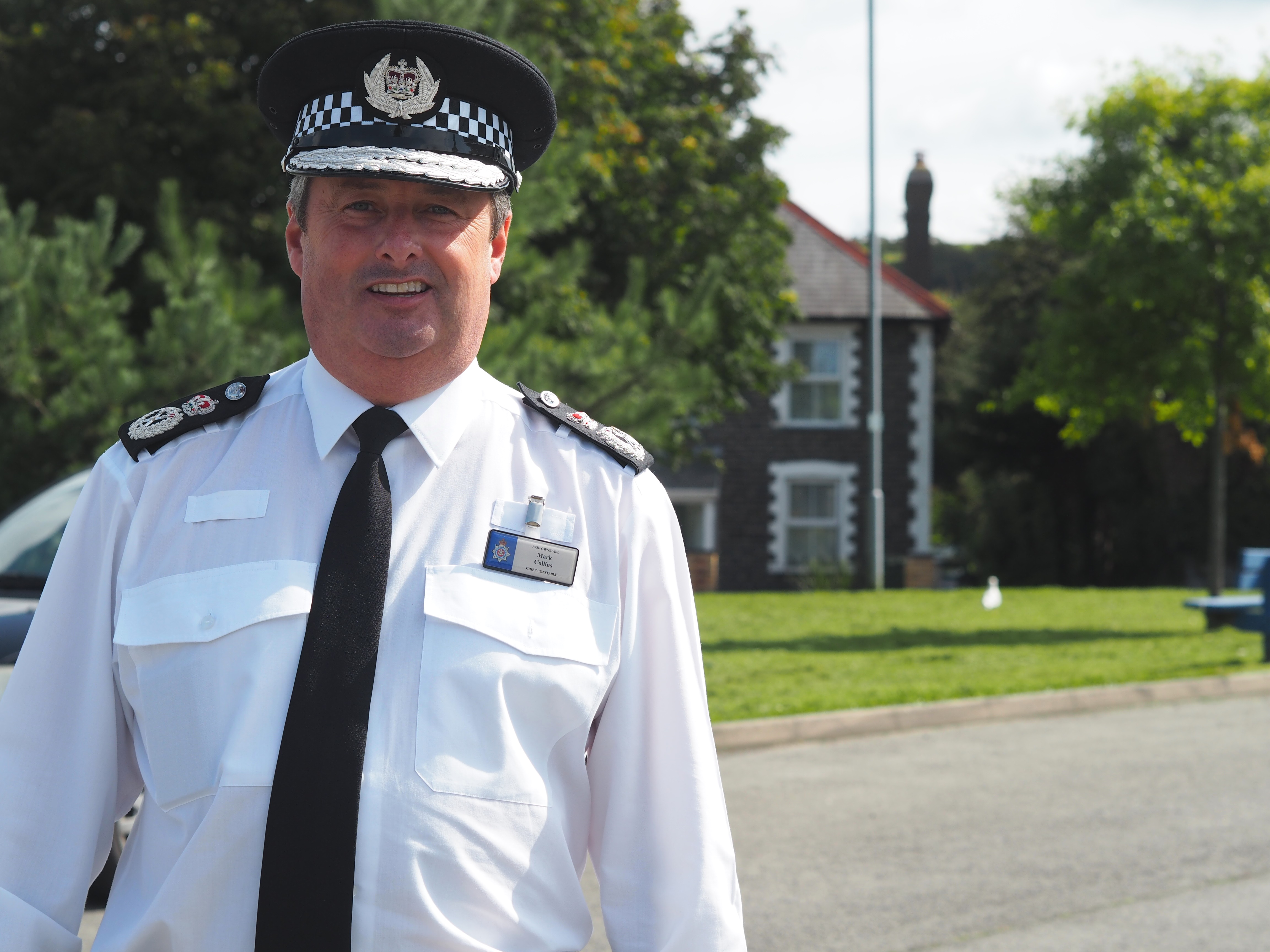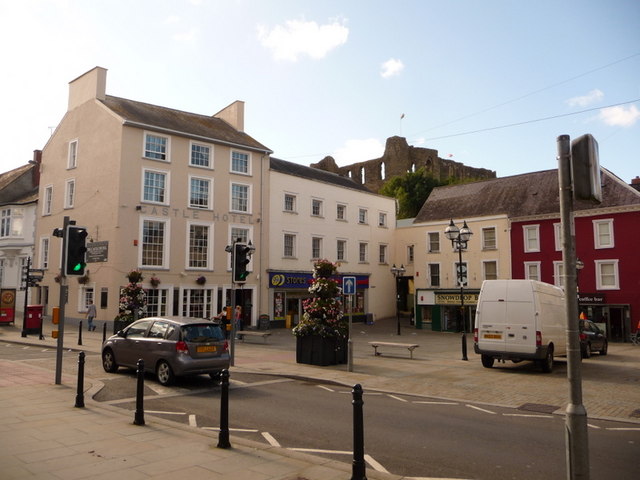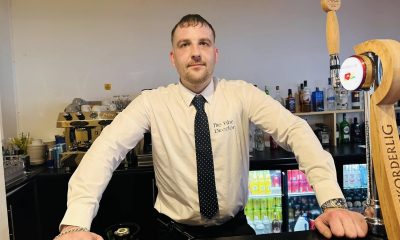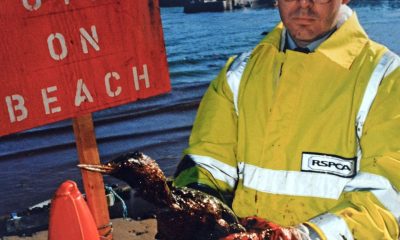News
Chief Constable looks back over four years as a volunteer officer

WHEN Mark Collins put on his volunteer police uniform for the first time in 1987, he could never have guessed that 29 years later he would be walking through the doors of Dyfed-Powys Police headquarters as the chief constable.
Mr Collins has worked his way up the ranks from a PC to the chief constable, but his policing career actually began as an unpaid officer volunteering his time to the force he now leads.
As the force celebrates National Volunteers Week, Mr Collins looks back over the four years he spent in the Special Constabulary and reveals what the police service gains from its team of volunteer officers.
Inspired in part by conversations with local officers in the Carmarthenshire village he grew up in, and partly from watching dramatic incidents unfold on TV series The Bill, Mr Collins was keen to join the police service as a teenager.
He decided firstly to enrol as a Special Constable so he could gain an insight into the role of a PC, and to find out if it was the right career for him.
“I thought I wanted to be a police officer, but not being from a policing background I wanted to find out what it was really like first,” he said.
“It was great to get in and see how the police worked – the roles and responsibilities of an officer, and the variety of things they dealt with. Having joined as a Special, it made me more hungry to join as a regular officer.”
After completing his initial training, Mr Collins went out on his first patrol shift as a Special Constable, supported by a regular officer.
“I spent my first shift travelling around north Carmarthen with Rhian Thomas, a rural officer, going to a number of calls,” he said.
“One memory that stands out is when we visited an elderly lady just outside Carmarthen. We dealt with some problems she had, and it turned out that she was a lady in her own right. We must have made an impact because she then invited us to a garden party.
“Knowing that you have helped someone is hugely rewarding, and as a Special it meant a lot to receive that invitation.”
A milestone for all officers is making their first arrest, and Mr Collins remembers his clearly. He was called to a report of a theft from a supermarket in Carmarthen, and arrested the culprit on the spot.
But he admits he was feeling a mixture of emotions as he put his training into practice.
“I was excited, but also nervous and anxious,” he said. “Was I going to get it right? Was I going to present the evidence to the custody sergeant correctly? It was a big deal, and something I definitely didn’t want to get wrong.”
Considering the perception of Specials, Mr Collins said a lot had changed over the years, with people’s attitudes towards volunteer officers becoming more positive, and more opportunities being opened up to volunteer officers.
Specials at Dyfed-Powys Police have worked on a mental health triage team, established the Specials on horseback scheme, and piloted a joint response unit with the Wales Ambulance Service over the Christmas period when demand increases on both services.
“If I’m honest, the training for Specials in the 80s wasn’t that good, and the support wasn’t that good,” Mr Collins said. “Regulars used to call them hobby bobbies back in the day, and they would only attend fetes and carnivals. You would occasionally get to walk the beat, but you didn’t have all the kit and equipment that we have now.
“We have moved on so much. We have a rank structure within the Special Constabulary, Specials are on the frontline with the same powers as fully warranted officers; they are better equipped; they carry out stop searches and warrants; and play an important part in policing operations.
“We recognise the specialist skills people can bring in from other jobs and the qualities they can bring to the force without needing to join as regular officers.”
Specials must be aged over 18, and must commit to a minimum of 16 hours each month to the force. While Mr Collins accepts that for many it is a way in to the police service, he would like to see more people apply with the aim of becoming ‘career Specials’ – those who are happy to continue as volunteers alongside their day-to-day roles.
“I would like people to see it as a way of supporting their communities, rather than as part of an aspiration to join the police service,” he said.
“It is a chance to do something different. There is so much reality TV, things like 24 Hours in Police Custody and Police Interceptors, and people are drawn in by the cut and thrust of policing – the fast response, blue lights flashing side of things.
“But policing isn’t all about that – there are the 2am patrols, traumatic incidents like attending sudden deaths or collisions, breaking the news that loved ones have passed away. Specials get the chance to dip into all that without giving up their day jobs.”
“For me, volunteering as a Special was the start of my policing career.
“Putting on your uniform for the first time is quite something, and it was a proud moment for both me and my family. And while I joined with aspirations of becoming a regular officer and a detective, never did I think when I walked through the doors of headquarters for the first time that I would walk back in 29 years later as the chief constable.”
News
Welsh Government says £205m package boosts economy as Bristol Airport protests

LAWYERS acting for the Welsh Government have defended a £205.2m subsidy for Cardiff Airport during a hearing before the Competition Appeal Tribunal, rejecting claims the support package is illegal or anti-competitive.
The ten-year funding deal, announced last year, is designed to expand routes, improve infrastructure and attract new airlines to Wales’ national airport.
But Bristol Airport has launched a legal challenge, arguing the subsidy distorts competition and gives Cardiff an unfair advantage.
During the hearing, government barrister George Peretz KC described the investment as “ambitious” and said it would deliver “much wider benefits to the Welsh economy”.
He told the tribunal the funding was not a rescue package for a struggling airport.
“This goes way beyond the survival, or not, of Cardiff Airport,” he said. “It is something much more ambitious.”
Route incentives defended
Around half of the £205.2m fund is earmarked for route development, aimed at encouraging airlines to open new services.
Bristol Airport claims these payments could unfairly entice carriers away from the South West of England.
But the Welsh Government said such incentives are standard practice across the aviation sector.
“If airports want to attract airlines, this is the game they have to get into,” the tribunal heard. “All airports offer front-loaded incentives on a commercial basis.”

Passenger cost disputed
Bristol Airport also argued that the package effectively equates to taxpayers contributing £71.50 per passenger.
However, Peretz said those calculations were misleading and failed to account for wider economic spending by passengers using Cardiff.
Ministers have already committed £20m in the current financial year, with the remaining funding to be phased over the next decade. Plans include new maintenance facilities, hangars and increased cargo capacity.
Decision pending
Bristol’s barrister, Ewan West KC, told the tribunal the subsidy should be declared unlawful but insisted the airport was “not seeking to drive Cardiff from the market”.
“Competition must be fair and lawful,” he said.
The tribunal, which sat for two days in Cardiff, is expected to reserve judgement until a later date.
If upheld, the decision could shape how far governments can go in supporting regional airports across the UK.
Entertainment
Families urged to explore historic Wales this half term with low-cost Cadw days out

FAMILIES across Wales are being encouraged to rediscover history on their doorstep this February half term, with more than 130 historic sites offering affordable days out.
Cadw, the Welsh Government’s historic environment service, says its castles, abbeys and ancient monuments provide low-cost options for families looking to get out of the house without breaking the bank.
From dramatic medieval fortresses to Roman remains and peaceful abbey ruins, many locations are within easy reach of local communities, making them ideal for a short day trip.
Nearby highlights include Caerphilly Castle, Caernarfon Castle, Raglan Castle, and the Caerleon Roman Baths, each offering a mix of history, open space and hands-on activities.
Good value days out
New visitor research carried out by Cadw shows strong satisfaction among guests. More than 85 per cent rated their visit as good, while nearly two in five said their experience was better than expected.
Families are being encouraged to bring picnics, book tickets online in advance and consider membership options to keep costs down, particularly for repeat visits over school holidays.
History brought to life
Several sites now include improved interpretation and interactive elements aimed at younger visitors.
At Caerphilly Castle, recent restoration work has recreated parts of the medieval interior, allowing visitors to step inside spaces such as the Great Hall and gatehouse to see how the fortress would have looked in the thirteenth century.
Meanwhile, children visiting Caerleon can take part in a daily Roman Baths trail where they can touch, smell and explore objects linked to life in Roman Britain.
Quieter winter exploring
Cadw says winter can be one of the best times to visit, with fewer crowds and dramatic seasonal scenery.
Places such as Tintern Abbey, Chepstow Castle, Criccieth Castle, and Valle Crucis Abbey offer peaceful walks alongside striking historic backdrops.
Something close to home
With sites spread across the country, most families will have a Cadw monument within a short drive.
Membership options provide unlimited entry throughout the year, with children admitted free with adult members, alongside shop discounts and reciprocal offers at other UK attractions.
Further details on opening times, events and tickets are available at the Cadw website.
Local Government
Residents invited to step forward for town council roles

HAVERFORDWEST TOWN COUNCIL is inviting local residents to put themselves forward for two vacant councillor seats, with positions currently available in the Prendergast and Priory wards.
The vacancies will be filled by co-option after no election was called when the casual vacancies were previously advertised.
The Town Council area is divided into five wards – Castle, Garth, Portfield, Prendergast and Priory – and is responsible for managing a range of local facilities and services including recreational play and leisure areas, a sports changing facility and two cemeteries.
Council representatives say they are looking for people who are willing to commit time and energy to serving the community and helping shape decisions that affect the town.
Applicants should be practical, good communicators and able to work as part of a team. No previous council experience is required.
Co-opted councillors take part in meetings, help oversee local projects and represent the interests of residents in their ward.
The closing date for applications is February 27, 2026.
Anyone interested in applying, or wishing to have an informal discussion about the role, can contact the Town Clerk by emailing [email protected].
Further information is available at: www.haverfordwest-tc.gov.uk

-

 Health6 days ago
Health6 days agoHealth board targets rise in steroid and gym drug use across west Wales
-

 Crime7 days ago
Crime7 days agoSex offender jailed after living off grid in Pembrokeshire and refusing to register
-

 Crime6 days ago
Crime6 days agoTeacher injured and teenager arrested for attempted murder at Milford Haven School
-

 Business2 days ago
Business2 days agoComputer Solutions Wales under fire from customers
-

 Business5 days ago
Business5 days agoSix-figure negligence victory leaves retired builder trapped in divorce limbo
-

 News6 days ago
News6 days agoReform appoints Dan Thomas to lead party in Wales
-

 Business4 days ago
Business4 days agoMinimum alcohol price to rise by 30 per cent as retailers warn of border impact
-

 Sport6 days ago
Sport6 days agoWales name squad for Six Nations opener against England





























